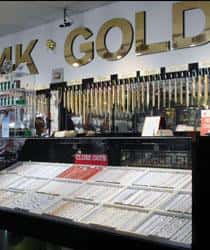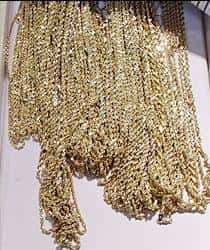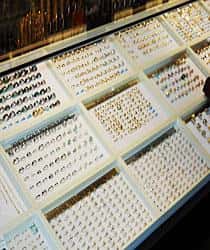My Trusted Jeweler Since 1978 !
Hours:
- MONDAY - FRIDAY: 10AM TO 7PM
- SATURDAY: 10AM TO 5PM
- SUNDAY: CLOSED
Emerald City : Gold



A Consumer’s Guide to Scams, Ripoffs, & Unfair Practices
Anyone dealing in precious metals should clearly disclose the amount they pay. Precious metals are a commodity, just like oil and natural gas. If a dealer makes statements like, “Prices change daily so we can’t give a figure,” it is likely that you will be offered far less than a fair price. If they can’t provide an estimate after being given the total weight, purity, and type of item being sold, it is best not to deal with them at all. Rather, deal with firms that provide payout information up front. When a store sells an item, their price is clearly stated – expect no less from someone looking to buy your precious metals.
If a firm does post buying prices which seem to be much higher than anyone else, be wary. These firms may practice bait & switch techniques. Remember, all business must make a profit to survive. If it seems to good to be true, there’s usually going to be a catch.
If mailing in your items, get a quote first. Many firms operate nationwide, and allow customers to mail in their jewelry and precious metals. Upon receipt, they perform a physical inspection and send a check based on their valuation of the item. Most of these firms consistently offer the lowest payouts. A recent investigation by a San Diego media outlet found that popular nationwide firms typically paid as much as 70% less than local buyers.
Look for a company that provides price quotes to those looking to sell their diamonds or jewelry before they mail the items in for inspection – they are likely to offer a great price and fair transaction. To avoid a bait and switch, ask if the company will stand behind their quote even after inspecting your item. All too often, a buyer will state one price, but after the physical inspection, the offer ends up being much less.
Deal with an organization that is committed to fair trade and believes in ethical business practices. Look for firms that are A+ rated by the Better Business Bureau. This simple step can save you time, frustration, and potentially a lot of money. No matter how large or reputable a company seems, always take the extra step. One of the largest gold buyers, who even advertised in the Superbowl, has an F rating with the BBB. In a recent investigation by “Inside Edition”, reporters sent them gold and were offered 20 to 30 percent of the amount that even local jewelers quoted.
And just because someone shows the BBB symbol, does not mean they are members. Even if they are, see how long they have been members, or have been operating. It takes a minimum of three years to get an A+ rating from the BBB.
Look for signs of stability and credibility. If at all possible, deal with a company who is licensed and bonded in the state where they are headquartered. This shows that they have provided the necessary information to local regulators, and are much less likely to be a “fly by night” organization. Additionally, buyers with a brick and mortar location which members of the public can visit to conduct business, are more likely to be credible. If a firm does not allow this, be cautious.
And while no one likes paperwork and regulation, be cautious if a buyer does not require identification or keep records, especially in large transactions. Gold and jewelry buyers are subject to provisions of the Patriot Act, as well as various state and local regulations. If a firm does not appear to abide by these policies, it is likely that they are not going to be entirely honest in their dealings with consumers.
Know what’s fair. Just because a firm advertises on TV or provides you with prepaid mailing materials, does not mean they pay more than other buyers. All too often, they actually end up paying less – and, in many cases, much less. So, how much should one be paid, and what’s fair?
The answer to this is subjective. However, follow these general guidelines to avoid underestimating, or even overestimating, the value of your items:
- When selling gold or other precious metals, a fair payout would be somewhere between 50 to 70 percent of the metal’s value, and, depending on how much material is sold at once, perhaps as high as 80 to 90 percent. Unless you need cash immediately, pawn shops should be used only as a last resort. They consistently pay much less than dedicated gold and jewelry buyers.
- There are many costs associated with the refining process, and there is a loss of weight involved in that process as well. For this reason, quotes from most reputable buyers will not deviate by more than 10 to 20 percent, as they must maintain a profit margin.
- Size does matter when it comes to diamonds. So does quality. Larger, higher quality diamonds will often sell for more than other smaller or lower quality pieces.
- Don’t be fooled by appraisals, since many jewelers use these to give the consumer a false sense of value. Remember, an item is only worth the amount someone is willing to pay at any given point. While you could have paid $1,000 for an item that came with a $10,000 appraisal, if it was really worth $10,000, do you think someone would accept 10 cents on the dollar? Appraisals are often grossly exaggerated, and even the jeweler who sold the item is fully aware of that. If an appraiser won’t offer at least 20% of their appraised amount, then they are providing you an exaggerated figure.
Pay attention to the details. As with anything else, not reading the “fine print” can get consumers in trouble. Know the policies and terms of a firm before you do business with them, to avoid unpleasant surprises.
One of the most common unfair practices of the less trustworthy mail-in buyers is their check policy. After receiving your items, these firms issue you a check. If you are unhappy with their payout, they require notification within ten days from the date the check was issued (not received). This often means that by the time you receive the check, you could only have a few days to get your items back. And with check in hand, many consumers find it difficult to return it in order to look for a better offer.
Be sure to find out a buyer’s policy on diamonds or gemstones. Many firms specialize only in gold or metals, and do not pay anything for diamonds and gemstones. If your item contains stones, some buyers will not pay you for them, pricing the item only on its metal content. Higher quality firms generally accept and pay for both stones and precious metals.
Finally, understand a buyer’s shipping policy. Are they responsible for items lost in the mail? Do they provide sturdy shipping materials or insurance? Some large buyers provide inexpensive prepaid mailing materials, and unsuspecting sellers just mail their items off with no real protection. An unscrupulous buyer could simply say the item never arrived, so tracking information is critical, especially on high dollar items. If a buyer will not allow you to ship using your own secure packaging and trackable delivery (such as USPS Registered Mail, Delivery Confirmation, or a parcel service such as UPS with real time tracking and delivery confirmations), tread carefully.
When selling high value items, opt for discretion. Pawn shops, notorious for their location in high crime rate areas, are never a good idea if you want to sell expensive jewelry. Even some “uptown” jewelry stores with large, conspicuous “cash for gold” type signage may unwittingly make themselves targets for robbery. If you feel uncomfortable with the area or location of a buyer’s store, ask if they would be willing to set up an appointment in your home. While no pawn shops and few jewelry stores will do so, serious jewelry buyers understand the need for high value transactions to occur in the safety and privacy of your home. If you cannot find a local buyer willing to do this, a reputable mail in firm may be your best solution.
In Conclusion
There are an endless supply of buyers, and many are trustworthy. Unfortunately, however, many are not. By doing some research, and referring back to this diamond selling guide, as well as demanding transparency, you can ensure a fair transaction every time. And once you have found a trusted buyer, share your experience with family and friends. In a slow economy, many Americans are selling unused gold, diamonds, and jewelry. Your research and recommendations could potentially help someone you know earn a much higher price for their items.

![[Most Recent Quotes from www.kitco.com]](https://www.kitconet.com/images/quotes_7a.gif)
